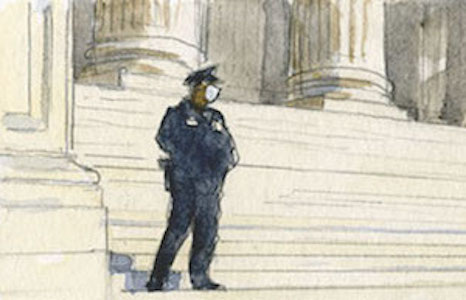Tuesday round-up

Yesterday the court stepped up its opinion output for the term considerably, releasing decisions in five cases. In Financial Oversight Board for Puerto Rico v. Aurelius Investment, LLC, the justices unanimously upheld the structure of Puerto Rico’s Financial Oversight and Management Board, ruling that the board’s members do not have to be appointed by the president and confirmed by the Senate because its duties are primarily local. Amy Howe analyzes the opinion for this blog, in a post that first appeared at Howe on the Court. For USA Today, Richard Wolf and Kristine Phillips report that the decision “enables Puerto Rico to continue its slow progress under a financial oversight and management board named in 2016 as part of a federal law but later challenged by investors.” John Kruzel reports at The Hill that “[a] ruling against the board would have created more fiscal turmoil for Puerto Rico as it continues to recover from a financial crisis that began in 2014 and proved to be the worst in its history.” For The Wall Street Journal (subscription required), Jess Bravin and Andrew Scurria report that “[l]urking behind the decision—and made explicit in a concurring opinion by Justice Sonia Sotomayor—was the broader question of Puerto Rico’s political status.” Additional coverage comes from Pamela King at Greenwire (subscription required) and Mark Walsh at Education Week’s School Law Blog. At Slate, Kyla Eastling, Danny Li and Neil Weare regret that the court declined the opportunity to overrule “the Insular Cases, a series of controversial decisions from the era of Plessy v. Ferguson that … has justified denying basic constitutional rights and protections to the nearly 4 million Americans living in Puerto Rico and other U.S. territories.”
In Nasrallah v. Barr, the court ruled 7-2 that courts can review an immigrant’s factual challenge to a denial of an application to stay deportation under the Convention Against Torture. Jennifer Chacon has this blog‘s argument analysis. In Banister v. Davis, another 7-2 decision, the court held that a prisoner’s motion under Federal Rule of Civil Procedure 59(e), which sets out the procedures for a motion to alter or amend a judgment, should not be treated as a second or successive petition for habeas corpus. At Crime & Consequences, Kent Scheidegger laments that in Banister the court “took a small step further down a road it has already traveled too far–bogging down federal habeas corpus cases by making them more like regular civil litigation in federal courts.”
In GE Energy Power Conversion v. Outokumpu Stainless, the court held 9-0 that, under an international convention governing the enforcement of foreign arbitral awards, a business that did not sign an arbitration agreement can still compel arbitration based on equitable estoppel. At the CPR Institute blog, Russ Bleemer writes that the court saw “no conflict between key international arbitration enforcement law implemented by the Federal Arbitration Act and state laws.” And in Thole v. U.S. Bank, the court held 5-4 that a participant in a defined-benefit pension fund that meets minimum-funding criteria cannot sue the fund managers when he has not actually suffered any financial injury. Dana Muir analyzes the opinion for this blog. For The Wall Street Journal (subscription required), Brent Kendall and Jess Bravin report that “the court ruled … along ideological lines that participants in U.S. Bancorp’s retirement plan couldn’t proceed with a putative class-action lawsuit alleging the bank’s pension managers violated their legal duties by making poor investment decisions.”
The justices also released orders yesterday from last week’s conference. They did not add any new cases to their merits docket, and they declined to review Jarchow v. State Bar of Wisconsin, a First Amendment challenge to Wisconsin’s mandatory bar membership and dues system. This blog‘s coverage comes from Amy Howe, in a post that first appeared at Howe on the Court. At The Washington Free Beacon, Kevin Daley reports that Jarchow was “one of several petitions pending before the justices that follow the 2018 decision that struck down mandatory government union dues on First Amendment grounds.” At the Cato Institute’s Unlawful Shield blog, Jay Schweikert writes that several pending cert petitions involving qualified immunity, which shields police officers from liability for official actions that do not violate clearly established law, offer the justices “a critical opportunity now to take the first steps toward correcting the legal and moral perversities” of the doctrine.
At The National Law Review, Evan Seeman looks at the court’s order late last week in South Bay United Pentecostal Church v. Newsom, denying a California church’s request that the court block enforcement of the governor’s restrictions on attendance at religious services. At Fox News (via How Appealing), Ronn Blitzer writes that the 5-4 order, in which Chief Justice John Roberts wrote an opinion explaining his decision to deny relief, shows that “Roberts continues to position himself as the high court’s swing vote — siding with both his conservative and liberal colleagues in close decisions.” At National Review (via How Appealing), Carrie Severino argues that “Roberts blatantly mischaracterizes the issue[:] The test of discrimination isn’t whether any comparable secular activity is treated as badly as religious activity, it is whether any comparable secular activity is treated better than religious activity.”
Briefly:
- In an op-ed at the Chicago Daily Law Bulletin, Daniel Cotter predicts a busy June for the Supreme Court.
- At The World and Everything in It (podcast), Mary Reichard discusses two oral arguments in cases involving President Donald Trump’s efforts to shield his financial records, including his tax returns, from subpoenas issued to his accountant and lenders by a New York grand jury and three congressional committees.
We rely on our readers to send us links for our round-up. If you have or know of a recent (published in the last two or three days) article, post, podcast or op-ed relating to the Supreme Court that you’d like us to consider for inclusion in the round-up, please send it to roundup [at] scotusblog.com. Thank you!
Posted in Newsletters